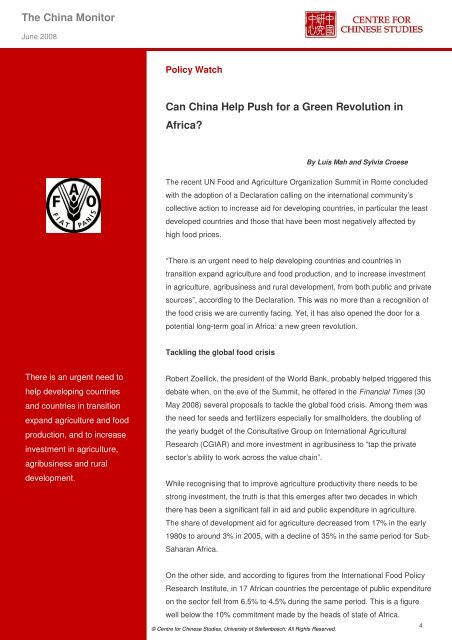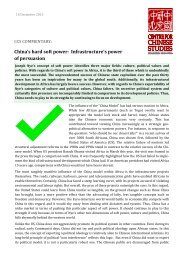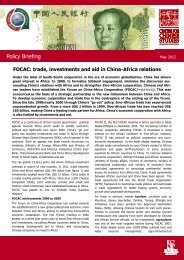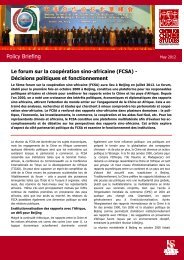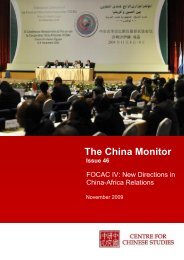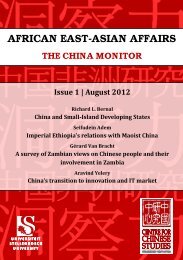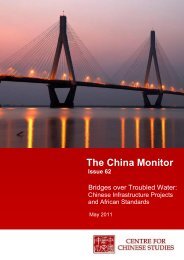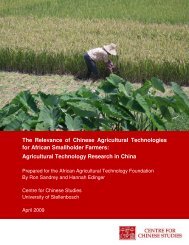The China Monitor - The Centre for Chinese Studies
The China Monitor - The Centre for Chinese Studies
The China Monitor - The Centre for Chinese Studies
Create successful ePaper yourself
Turn your PDF publications into a flip-book with our unique Google optimized e-Paper software.
<strong>The</strong> <strong>China</strong> <strong>Monitor</strong>June 2008Policy WatchCan <strong>China</strong> Help Push <strong>for</strong> a Green Revolution inAfrica?By Luís Mah and Sylvia Croese<strong>The</strong> recent UN Food and Agriculture Organization Summit in Rome concludedwith the adoption of a Declaration calling on the international community’scollective action to increase aid <strong>for</strong> developing countries, in particular the leastdeveloped countries and those that have been most negatively affected byhigh food prices.“<strong>The</strong>re is an urgent need to help developing countries and countries intransition expand agriculture and food production, and to increase investmentin agriculture, agribusiness and rural development, from both public and privatesources”, according to the Declaration. This was no more than a recognition ofthe food crisis we are currently facing. Yet, it has also opened the door <strong>for</strong> apotential long-term goal in Africa: a new green revolution.Tackling the global food crisis<strong>The</strong>re is an urgent need tohelp developing countriesand countries in transitionexpand agriculture and foodproduction, and to increaseinvestment in agriculture,agribusiness and ruraldevelopment.Robert Zoellick, the president of the World Bank, probably helped triggered thisdebate when, on the eve of the Summit, he offered in the Financial Times (30May 2008) several proposals to tackle the global food crisis. Among them wasthe need <strong>for</strong> seeds and fertilizers especially <strong>for</strong> smallholders, the doubling ofthe yearly budget of the Consultative Group on International AgriculturalResearch (CGIAR) and more investment in agribusiness to “tap the privatesector’s ability to work across the value chain”.While recognising that to improve agriculture productivity there needs to bestrong investment, the truth is that this emerges after two decades in whichthere has been a significant fall in aid and public expenditure in agriculture.<strong>The</strong> share of development aid <strong>for</strong> agriculture decreased from 17% in the early1980s to around 3% in 2005, with a decline of 35% in the same period <strong>for</strong> Sub-Saharan Africa.On the other side, and according to figures from the International Food PolicyResearch Institute, in 17 African countries the percentage of public expenditureon the sector fell from 6.5% to 4.5% during the same period. This is a figurewell below the 10% commitment made by the heads of state of Africa.4© <strong>Centre</strong> <strong>for</strong> <strong>Chinese</strong> <strong>Studies</strong>, University of Stellenbosch; All Rights Reserved.


